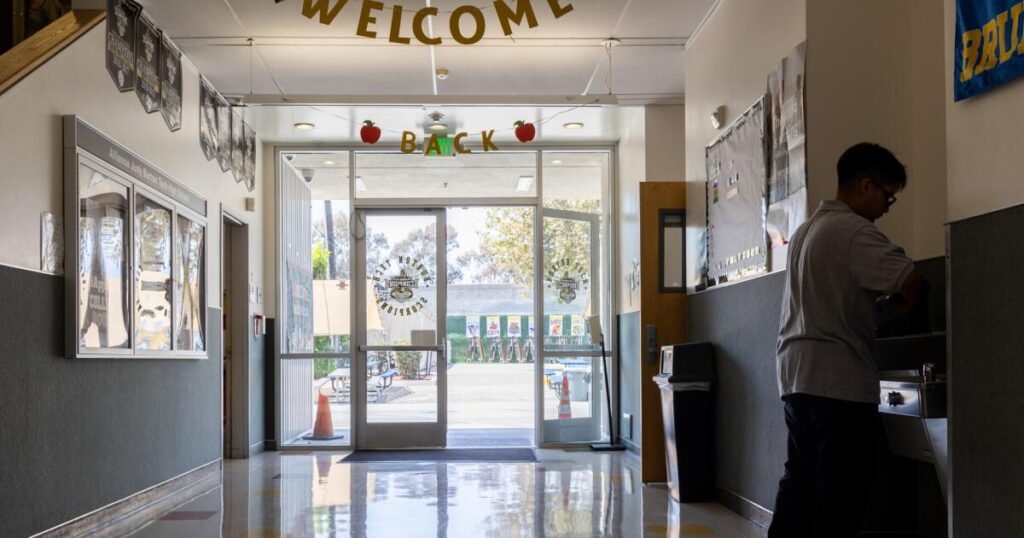Los Angeles public schools are set to reopen Thursday, beginning their new school year amid a historically challenging climate. They are taking bold actions to shield children and their immigrant families from federal immigration raids.
To enhance safety, school police, along with military personnel, will patrol approximately 100 schools, particularly focusing on Latino neighborhoods. They have established “safe zones” near high schools frequented by older students. Additionally, bus routes have been modified to cater to immigrant families, minimizing students’ exposure to immigration authorities on their way to school.
Community volunteers, collaborating with district staff, will act as scouts. Should any enforcement activity occur near a school, the campus will be locked down, and parents will be promptly informed via email and text.
Los Angeles Mayor Karen Bass highlighted the significance of the moment during a press conference with local officials. She emphasized the joint commitment of elected leaders and educational figures to safeguard children from federal interventions.
LA Schools Superintendent Alberto Carvalho reiterated that the district will resist any entity that attempts to disrupt children’s education at any level. He expressed confidence that they are on the right side of the Constitution and history.
A high school boy was mistakenly handcuffed
Parental concerns about safety are not unfounded.
Recently, federal agents reportedly drew their weapon on a 15-year-old boy outside Arleta High School and mistakenly handcuffed him. The situation escalated, but the boy’s family was able to convince federal agents he was not the suspect they were pursuing.
By the time school leaders rushed to the scene to assess the situation, the school police had also arrived and collected a bullet that had fallen to the ground during the encounter, according to Carvalho.
A spokesperson for US Customs and Border Protection clarified that Arleta High was not the target of the operation; rather, they were conducting operations aimed at “illegal criminal aliens.” They described it as a focus on known gang affiliations linked to Salvadoran nationals with criminal histories.
During a White House briefing, spokesperson Caroline Leavitt responded to queries regarding the incident, commenting that she would investigate the truth behind the report, acknowledging potential misinformation from the LA Times. She stressed that the administration aims for all schoolchildren across the nation to attend school without fear.
The horror school community
The events at Arleta High reflect ongoing tensions throughout the region, which saw federal troop deployment in Los Angeles as part of the Trump administration’s strategy to apprehend undocumented immigrants.
Despite a lawsuit that temporarily restrained enforcement actions, federal officials have maintained that they continue their operations. The administration’s policy emphasizes that schools are not exempt from their enforcement initiatives aimed at deporting a substantial number of undocumented immigrants.
Democratic representative Jimmy Gomez remarked that the ensuing climate of fear leads many to self-report their undocumented status, causing trauma within school communities concerned about nearby enforcement actions.
Most public school systems in the state, including LA Unified, are committed to defending children’s rights to education, regardless of their immigration status—a right upheld by previous U.S. Supreme Court rulings. However, there is a growing awareness among educators that they must also protect the families of their students.
On Tuesday, 30 school board members from various LA County districts united to discuss strategies for safeguarding immigrant families.
Alma Castro, a member of the Lynwood Unified School Board, noted their apprehension about how fears might keep students from returning to school, calling her district a “safe shelter.” To that end, measures have been implemented to ensure that student information is kept secure and that campus access is restricted.
Protecting immigrant families
With around 400,000 students in LA Unified, officials have dedicated months to developing protective strategies, incorporating suggestions from teachers’ unions and immigrant advocacy groups.
One key initiative is the establishment of safe passage networks aimed at guiding families to and from schools while minimizing the risk of encountering immigration agents. These networks involve collaboration between paid groups, district employees, and volunteers. The school police are actively monitoring sensitive areas, and there are discussions among activists about protecting students without police involvement.
Carvalho noted the expansion of these efforts from 40 designated areas last year to at least 100 this year.
He highlighted the immense challenge of ensuring community safety: “Given the size of our community, it’s virtually impossible to have a caring individual on every corner. But we’re deploying resources like never before.”
Other initiatives include:
- Creating a task force to coordinate safe zones with local cities.
- Starting a compassion fund to help families with legal expenses.
- Providing food assistance for families in need.
- Offering legal referrals.
- Reaching out to over 10,000 families encouraging school attendance.
- Sharing information about online schooling options.
- Distributing a “Family Preparation” Guide.
Carvalho reaffirmed that immigration agents would not have access to school environments unless armed with a judicial warrant concerning specific individuals.
“I can’t predict what registration will look like,” he remarked. “It’s likely many parents have already left our community out of fear. We hope that through our efforts, we can encourage stable school attendance for the children.”
Reasons to be afraid
A Los Angeles mother, who chose to remain anonymous, faced a daunting situation in May when immigration agents arrived at her home for a “wellness check” on her children. Equipped with knowledge gained from her local public school, she maintained her resolve to keep them out, not answering the door.
Ultimately, eight agents left after arriving in a convoy of three vehicles.
This mother is part of a community where the tension surrounding immigration has impacted school attendance significantly, with attendance dropping to less than 80% for some schools last spring—a decrease attributed to fears of deportation. For low-income Latino families, this anxiety continues to rise; efforts are being made to identify and understand the community’s struggles.
Rocio Rivas, an LA School Board member, acknowledged the pervasive atmosphere of fear but encourages families to send their children to school, believing it might be safer than other places.
The Alliance Charter Group, to which many students belong, emphasizes mental health support and organizes carpools, but only with US citizens driving.
Carvalho stated that every child deserves an education free from trauma, asserting their right to a welcoming and enriching school experience.







